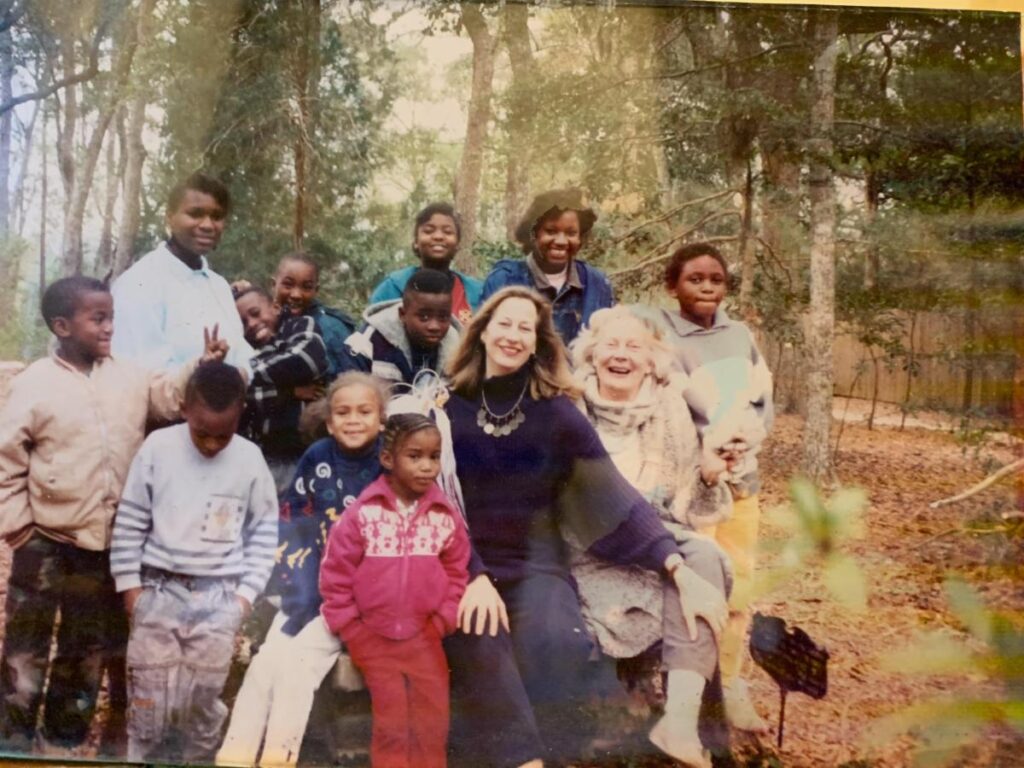
November 29, 2019
The Acorn that Bore the Mighty Oak
In 1968, one of the last things that Meher Baba signed was a children’s book that He sent as a gift for a group of children known as “Happy Club.”
Happy Club began in 1966, when Elizabeth Patterson, one of the founders of the Center, and 13-year-old Wendy Haynes, drove to a local African-American neighborhood to pick up Elizabeth’s cook and housekeeper, Bessie. At Baba’s request, Bessie had cooked for Him on each of His three visits to Myrtle Beach, and she was much loved both by Baba and by the women mandali.
It was a rainy day, and when they arrived at Bessie’s house, they saw her three grandchildren playing in the mud outside. Something struck Wendy. “Aunty Boo, why are they playing in the mud?” she asked Elizabeth. Elizabeth turned to her, “It’s because they have no place else.” In that moment, Wendy felt compelled to ask, “Aunty Boo, do you think they could come to the Center sometime to play?”
The next week, the three grandchildren spent the afternoon at Baba’s home. The week after, seven children came; after three months, there were 45. Soon, the number was well over 100. The children spent time playing in nature, learning games and songs, doing arts and crafts, and eating peanut butter and jelly sandwiches. After a few months, Wendy asked the group what they wanted to be called. “Happy Club!” was the resounding answer.
Reverend William Gause, an unflagging advocate and worker for the Racepath community over the years, was once in Happy Club, and he describes the experience: “You got to meet people who loved at you. You didn’t hear no bad language from them, they didn’t mistreat you, they just loved you and they cared for you. And that rubbed off on me. And that’s why, one part of it, of me working here in the community, in spite of all the bad names and everything that’s been going on, I’m still standing through it all.”
Elizabeth described the kids in Happy Club as having a “plus quality,” something indefinable and special. Wendy relates, “The children on some level knew—well not even on some level, they knew that this was a very special place. [In their letters to Baba on His birthday] they would always say … on their own … ‘I love Baba, I love God.’ They felt Him on some level.” Baba said that Happy Club made Him very happy.
Elizabeth later referred to Happy Club as the “Acorn that bore the mighty oak.” Picking up children from Happy Club and getting to know their families, she and Jane began to recognize severe unattended needs—lack of sewage, running water, preschools for children, medical access. They began working tirelessly with the people there and with other Baba lovers. Eventually, multiple non-profits, a preschool, and a medical clinic were all established. The connection between the two communities continues today with a constant back-and-forth of love, from support with day-to-day needs to the delicious Thanksgiving Dinner shared on the Center, cooked with such care by our Racepath family each year.
When Jane died, her funeral was held at an African-American church in the Booker T. Washington neighborhood. The church was packed with people from the nearby community, along with those from the Meher Baba community. Unbidden, one woman in her nineties stood up and began singing a stunning rendition of “Precious Lord, Take My Hand”—a gospel song that Baba Himself loved. After Jane died, a picture of her was placed, along with one of Elizabeth, in that church as well as in the Racepath Community Center.
Reverend Gause is still hard at work making his community a better place. He runs the non-profit Phoenix Renaissance that Jane founded, providing critical services like a food pantry, an emergency assistance program, and a safe and loving afterschool and summer program for kids. “My dream is to see Phoenix as Jane did,” he says, “to spread through Horry County to every low-income community and to assist those that are in need, those that are not able to climb the ladder by themselves. To be able to help them climb the ladder, and one day they can say ‘I’ve been to the mountaintop.’”
And each year, during the Phoenix Renaissance summer program, the kids come back to the Center, to look wide-eyed at the trees and the animals and the pictures of Baba. In those moments, as the kids roam around the wonderful playground of Baba’s home, their laughter hearkens back to the laughs of Happy Club—the kids who drank in the love and support, ate dozens of peanut butter and jelly sandwiches, and made beautiful cards and drawings for Baba’s birthday. It hearkens back to the kids whose picture Baba held in 1966, gliding His finger across the photo to bless each one. And it reminds us of our interconnectedness, of the opportunity we all provide for each other to give service and to give love.